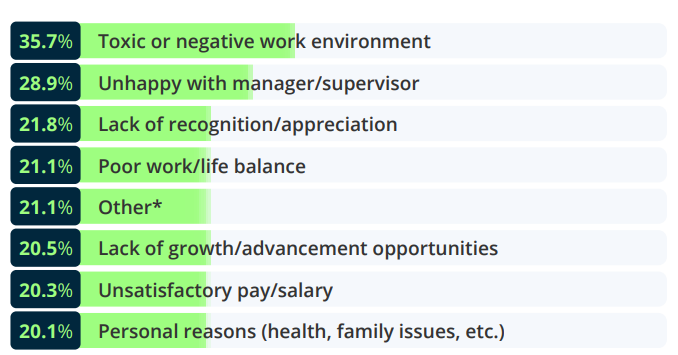Toxic workplace top reason for resignations
iHire’s CPO exclusively shares new data with UNLEASH.
News In Brief
Quit rates remain high in 2023.
But pay is not the leading factor, toxic workplaces are, according to US data from iHire.
Let's dig into the data with CPO iHire's CPO Lisa Shuster.
The ‘Great Resignation‘ may be over, but that doesn’t mean that employers’ resignation woes have ended.
A survey of 3,700 employees and 400 employers in the US by iHire found that voluntary resignation remained steady in 2023 – compared to 2022 figures.
43% of those surveyed said they had quit a job in the last 12 months, this is up 5% from 2022. In addition, 73% of employers said the majority of their turnover was voluntary – in other words, layoffs were not impacting these quit rates.
And this trend is going nowhere. 39% of employees expect to leave their current job within the year (34% are unsure), while 13% of employers anticipate turnover to increase in the next three months and almost half (47%) think it’ll stay the same.
Pay is not the main driver of high quit rates
Interestingly, these continuing resignations come despite overall job satisfaction increasing 16% over the last year.
In 2023, 56% of workers told iHire they were satisfied with their current or most recent jobs.
So, what is pushing employees to continue to resign in large numbers?
CEO of iHire Steve Flook shared: “Although survey respondents expressed greater job satisfaction, today’s talent won’t hesitate to pursue a new opportunity if they believe it better aligns with their values and aspirations.”
However, talking exclusively to UNLEASH about the findings, iHire’s CPO Lisa Shuster adds: “We were most surprised to find that pay hasn’t been the main driver of turnover in 2023.”
In fact, iHire’s study found that pay was the 7th reason for leaving (20%) – coming in at number one was toxic or negative work environment (36%).

Credit: iHire.
However, an issue is that employees aren’t being honest in their exit interviews.
Shuster explains: “When we asked employers to identify the most common reasons departing employees are giving for turning in their two weeks’ notices, unsatisfactory pay was the second most popular answer.”
The reason for dishonesty is “perhaps because of a lack of psychological safety and trust due to the aforementioned toxicity and poor relationships with management”.
A lot of food for thought with CHROs and their teams here, but Shuster’s top advice for her HR peers who want to “get to the bottom of turnover” and succeed at retention is this: “Employers need to focus on culture and the employee experience”.
She continues: “Creating and nurturing work environments characterized by communication, transparency, and empathy will be more critical than giving pay raises, as competitive pay has become table stakes in today’s labor market.
“Offering greater flexibility in where and how work gets done, providing upskilling and reskilling opportunities, supporting associates’ mental health and wellbeing, and showing meaningful appreciation are good places to start.”
Sign up to the UNLEASH Newsletter
Get the Editor’s picks of the week delivered straight to your inbox!

Chief Reporter
Allie is an award-winning business journalist and can be reached at alexandra@unleash.ai.
